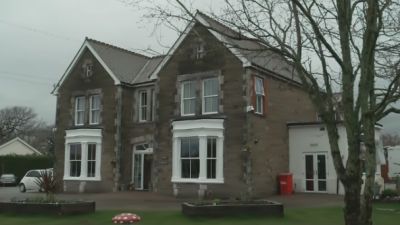Calls for rehab to be more than 'last resort' for addicts

On an anonymous road just outside Llantrisant is a place offering hope for addicts.
When people come to Brynawel Rehab with an addiction - be it drugs, alcohol, gambling, sex - they are often at their lowest ebb, having exhausted all other options and reached rock bottom.
Brynawel’s chief executive Sue Gwyn has worked in rehabilitation services for 35 years. She says that while rehab isn’t for everyone, it should be offered at the start of someone’s treatment rather than as a last resort.
“I would argue that the majority of the entire population we've got certain behaviours or habits that don't benefit their health. Smoking, drinking alcohol too much, high risk activities, nitrous oxide, you name it.
"There's lots of behaviours that lots of us indulge in, that might result in things like you know, diabetes. I'm overweight, I might end up having type two diabetes, but what at any point my GP say to me, well the gold standard treatment that will give you a really good chance of losing weight would be X, but we're going to expect you to try everything else before we give you that treatment.
"It wouldn't happen it wouldn't happen in cancer services. So I think it's kind of about parity of esteem is about parity of offer. Why should people because they have an addiction problem be offered any lesser standard of service than any other illness or condition because nobody chooses to become addicted to something."
Speaking to ITV Cymru Wales's Sharp End, Sue said: “I think it [rehab] should be on the menu of interventions discussed at assessment for everybody. It's just not good enough. What other health service if you like or social care service would stand by and wait for somebody sometimes to get to the lowest point. So some of the people that come into Brynawel are physically really unwell. It's not for everybody because some people aren't ready to engage in change. But I certainly don't think it should be a last option.”
Those who run Brynawel say it’s unique - one of only two not-for-profit rehabilitation units in Wales and the only one to provide rehab for those with alcohol-related brain damage. The eight-bedroom house itself was left as part of a charitable trust to provide relief from alcoholism for men. Now 48-years-on, the centre provides rehabilitation and treatment to any adult who has a substance misuse issue or alcohol-related brain damage.
Residents coming into Brynawel have been referred by community services and often have a dual diagnosis, where mental health problems coexist alongside the addiction. Sue says that often this means that they can’t always engage with services in the community.
Brynawel offers a 16-week programme including cognitive behaviour therapy, dialectical behaviour therapy and relapse prevention, alongside alternative therapies such as meditation, mindfulness practices and yoga. Once someone has completed the programme, they have follow-up appointments for a year. When it comes to measuring success, Sue says the aim isn’t always about complete sobriety, but progress through recovery.
“The clients that we follow up for a year, about 50% of them are sober or not using drugs at the end of the year. People tend to see complete sobriety as being the you know, the mecca of recovery if you like and actually it's not. There are layers underneath that.
“If somebody is managing to maintain relationships, if they're managing to be a better parent, if they're managing their finances better, if they’ve found, you know, accommodation or if they found employment. All of these are points of progress. And actually, I don't think it's up to us to say what your recovery should look like.”
The centre recently came to the attention of the Royals with the Prince and Princess of Wales visiting in February. Sue said: "I was really taken aback at how informed they were around addiction around addiction models around treatment around the work that we do here. I had a conversation with the Princess of Wales about the early years impact for children and how that sometimes translates through to mental health and addiction problems later in life."
The staff at Brynawel know that not every addict is ready for rehab, but Sue says when people come to them for help, they know they're ready to try to change.
"Sometimes in the community, you work with people who are a bit ambivalent about changing their drug use or not interested in changing the drug use or not interested in recovery. We're not having those conversations. The people that come into Brunel are ready for recovery. They're committed to it."
You can see more on this story on tonight's Sharp End at 10:45pm.